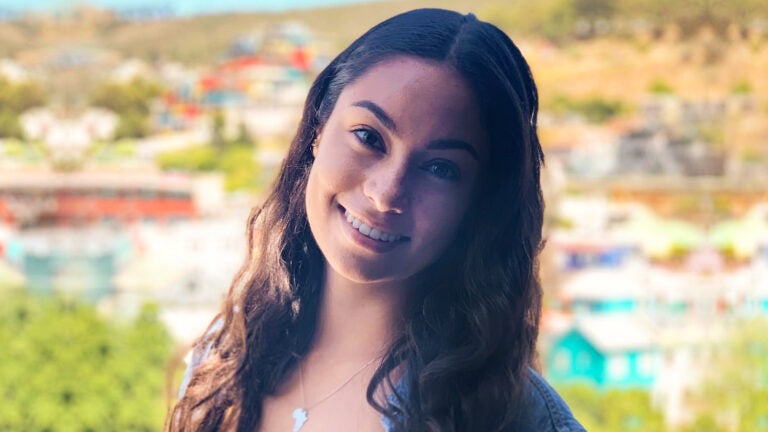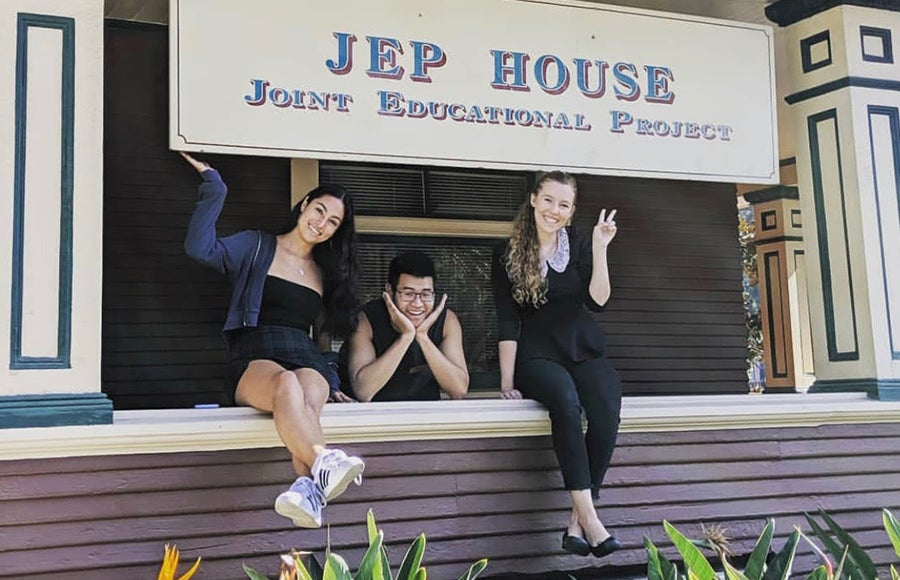
From South Africa to L.A.: Student traces her global journey to USC Dornsife
Francesca Jacke’s decision to study at the USC Dornsife College of Letters, Arts and Sciences was due in large part to a chance encounter on the other side of the globe, in South Africa.
She had recently been accepted to several colleges in the United States. “When I got the news that I had gotten into USC, UCLA, NYU and some other places, the choices were overwhelming,” she said.
While she and her mother sat in a Cape Town cafe considering her options, several Americans from Los Angeles sat down nearby and, overhearing her conversation, chimed in about their experience in L.A.
“Their advice was that downtown was very up and coming, and that was why they’d choose USC,” she said. She followed their advice.
Growing up all over the world
Jacke was born in Mauritius, a small island nation in the Indian Ocean. When she was 5, her family moved to Germany, her parents’ homeland and the country of her citizenship.
At age 9, she and her mother relocated to Cape Town, a place she called home through high school. She is back there now, waiting out the COVID-19 pandemic and working at her mother’s nonprofit, West Coast Kids South Africa, which focuses on children’s educational, health and social development.
Jacke, who is trilingual in English, German and French, spent her elementary through high school years attending a private American international school among students and faculty from many different countries. But she noted that despite this cultural diversity, the school was financially out of reach for many normal South Africans.
Even today, more than 25 years after apartheid rule ended, rigid segregation still persists, she said. In minutes, one can drive from a white neighborhood with large houses to a racially segregated, impoverished “township.”
“Seeing those stark differences every day emphasizes that apartheid was so recent and the aftermath is still very palpable,” Jacke said. “Systemic racism didn’t just go away — those race dynamics are very complicated and are very much alive and well.”
Arriving in America
When Jacke first arrived in L.A., her visions of California as a “beach, sunshine, jogging-with-a-smoothie-in-your-hand type of place” got a reality check. Driving from the airport to the campus, she glimpsed the poverty and homelessness that are as much a part of the city’s landscape as the beaches and canyons are.
“From international views, the U.S. is portrayed as very developed, which it is, but seeing that other side of it, I was surprised and I felt a little unprepared for the experience,” she said.
But once she settled in at USC, Jacke dove into one of L.A.’s most archetypal pursuits — acting. She took her first class “just to see where it went,” but it was rigorous and challenged her in ways she valued. A hobby quickly turned into a theatre major, a joint program between USC Dornsife and the USC School of Dramatic Arts.
Her second major, health and the human sciences with an emphasis in gender and ethnicity, appealed to Jacke through its flexibility and interdisciplinary opportunities; she has been able to attend courses in psychology, international relations and gender studies.

International education
Aside from her on-campus studies, Jacke sought out ways to get involved with the city itself. During her first semester at the university, she began working with USC Dornsife’s Joint Educational Project (JEP). She became a JEP program assistant for the 2019–20 year, overseeing the “international ambassadors,” USC students from other countries who volunteer to teach students in the L.A. Unified School District (LAUSD) about their home countries, traditions and cultures.
“I loved my job; it felt like a family. And the JEP staff was mostly women, and I love working with women leaders,” she said.
Jacke also served as an ambassador herself, teaching first-grade students at the 32nd Street School about South Africa. Teaching young children was at once enlightening and challenging, she says.
“With little kids, you tell them one little detail, like, ‘In South Africa we have zebras,’ and then the interest goes there. But it was so much fun. I wouldn’t replace it with any other age group,” she said.
The experience also highlighted some differences between students in South Africa and those in the United States, she said. One had to do with the idea of a college education — whether due to USC’s proximity to the school or other factors, the children at 32nd Street already had ideas about universities and were curious to learn more about them. Also, L.A. schools offered more technology than South African schools, she added.
“In LAUSD there were projectors, computer resources and so on, whereas for schools in South Africa, electricity is insecure. The government cuts off our electricity almost daily,” she explained.
But it wasn’t only with young students that Jacke experienced a sense of cultural distance. At USC, she was often asked questions about living in Africa — “people often generalize South Africa as ‘Africa,’” she remarked — and realized some of the university’s students weren’t as informed about the continent as they were about Europe and South America. Even with Black students who wanted to find out more about Africa and its cultures, there was still a cultural barrier, she said.
“I had a student come up to me who wanted to study abroad here in South Africa. She expected to get back in touch with her African heritage. I kind of warned her a little. ‘As soon as they hear your accent they will know you’re a foreigner,’ I said. Also, the culture here has been so colonized and so Europeanized that I wanted to make sure she wouldn’t be too disappointed,” Jacke said.
The next act
Jacke, who plans to graduate in 2021, may complete her final graduation requirements through a USC program at the British American Drama Academy in London, depending on where the COVID-19 pandemic stands. While she wants to pursue acting further, she hasn’t yet decided how her career path will shape up.
“I did a Maymester for my health sciences major — NGOs and social change. That definitely geared me towards looking into a career in the nonprofit sector — human rights, women’s rights — and I want to look at how that might combine with the arts in some way,” she says.
Whether in health or the theater, Jacke’s career path is likely to lead to Europe, at least in the short term. And with EU citizenship and a grandmother waiting for her in Berlin, she’s ready for her next act.